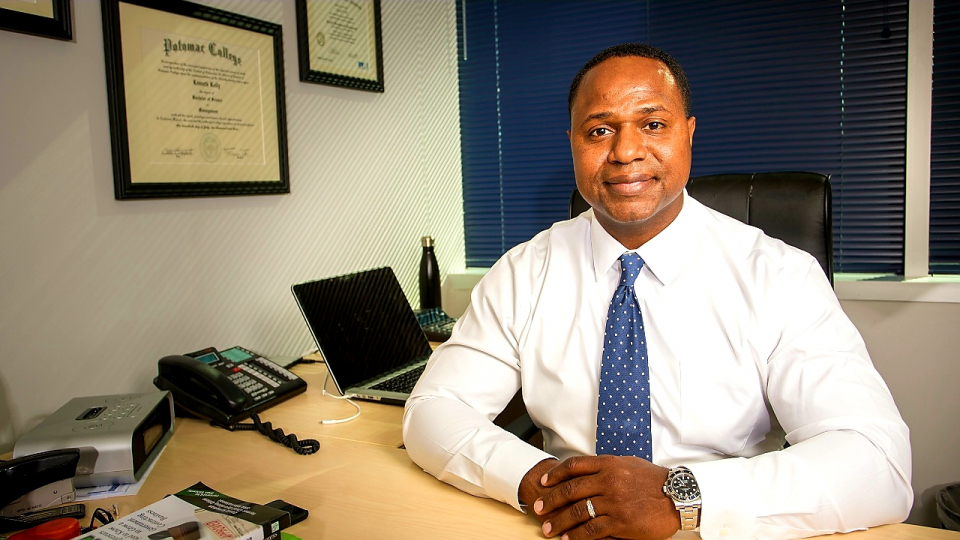
“I’ve always been an entrepreneur — from mowing lawns and delivering grocery as a teen, to selling laptop computers in my early 20s.” –Kenneth Kelly, president and CEO, Strativia
Prior to co-founding Strativia, Kenneth Kelly worked for Visual One Systems Corporation where he managed financial management software installation projects at hotels and resorts throughout the world. He was later employed with Micros Systems Inc. (now Oracle), the world’s largest hospitality software developer. After 12 years in corporate America, Strativia was birthed in June 2007 and recently celebrated 10 years of excellence in service. Headquartered in Largo, Maryland, with offices in Atlanta and Denver, Strativia has been awarded nearly $50 million dollars in government contracts over the past year alone and has no plans of slowing down. “And we don’t wait for tomorrow. We do it all with exceptional speed, mindful of the need to solve the problem now,“ says Kelly.
When did you know you wanted to become an entrepreneur?
Many years ago, I worked for a software company implementing property management systems at hotels and resorts all over the world. While installing a system at Pepperdine University’s Graziadio School of Business, I met Angelo Mozilo, former chairman and CEO [of] Countrywide Financial Corp. He was a board member and I remembered he exuded an aura of power, prestige and purpose.
Intrigued [by] our conversation, I knew instinctively that I wanted to start a business. More than a year later, I wrote Mozilo a letter and shared my plans of starting Strativia. This was before email was the primary method for written communications. He wrote back on embroidered card stock and shared his elation in my decision to start a business and pushing forward. Even before I knew what entrepreneurship really entailed, a billionaire businessman (at the time) was the inspiration that illuminated my path.
How difficult was it to make the shift into full-time entrepreneurship?
After consulting and praying with my wife, we both had peace with me leaving corporate America to start Strativia. I recall thinking at the time that no one would take Strativia seriously unless I was full-time. Fortunately, we had savings where we could leverage in the beginning. My wife continued to work full-time so the transition was somewhat palatable. That was over ten years ago and we haven’t looked back since.
How would you define an “entrepreneurial mindset”?
Although drive, ambition and tenacity are at the core, I believe the mindset is about “being” your business. For instance, anyone who knows me automatically knows of Strativia as we are one in the same. Just as you can’t mention Microsoft, without thinking of Bill Gates, or Apple without thinking of Steve Jobs. Bonafide entrepreneurs who have built lasting brands can rarely be separated from their business because their brand is an interchangeable extension of them. Therefore, the entrepreneurial mindset is becoming your business which includes the transition from entrepreneur to CEO moving away from “flying by the seat of your pants” to developing real processes, systems, and standard operating procedures.
Share a few pivot points of Strativia’s successes:
2007 – Strativia was launched and we focused heavily on commercial sales for the first few years. Commercial sales were easier to close and often the barriers to entry were minimal if any.
2010 – We amassed enough commercial past performance as a company to begin to approach state and local government customers. It’s extremely difficult to win any government business without past performance. Furthermore, there is a range of registrations and corporate credentialing required to do business with the government. For the next few years, we’d focused on winning state and local business as either a prime or subcontractor and overall build our business portfolio.
2013 – We targeted federal customers, which tends to be the most difficult to win if you don’t have the right past performance, partners, contract vehicles and a range of corporate credentials. As a strategy, we targeted prime contractors so that we could become their subcontractor. As a subcontractor, we were building critical federal government past performance that would subsequently assist us in pursuing and landing prime federal contracts on our own.
2016 – The federal government accounted for a good portion of our revenues because the contracts were larger in dollar value and longer in duration. By volume, we had more contracts with commercial, state and local, customers. However, our federal contracts represented a larger portion of our overall revenue.
2017 – The company celebrated its 10th-anniversary milestone.
How does it feel knowing that you’re actually a part of the solution, through job creation and economic revitalization?
It’s rewarding to know that Strativia is responsible for providing a livelihood, including health care, educational expenses and a myriad of benefits to hundreds nationwide. Beyond benefiting our direct employees, vendors and their families, I’m equally aware that as a good corporate citizen, our taxes positively impact counties, cities and states where our employees reside. I’m beyond grateful to be a solution provider for the greater good of the world.
As an industry influencer, what’s your advice to those who are starting their new business, or pursuing business opportunities in your industry?
I’ve always researched and studied both the business leaders and their companies collectively from afar. Meaning I knew who they were, their industry and even their core competitors, even though I didn’t always approach them directly. During the process, I’d read their executive profiles, service offerings, high-level strategies, press releases and applied what worked and made sense to Strativia. No matter what industry you’re in, there are always lessons to be learned from others that have gone before you. Beyond studying business leaders directly, I read, read and read some more. This is where I’ve gained the most insight that has helped anchor me over the years. Success leaves clues.
How important is entrepreneurship to the community?
I’m clear that I have a responsibility to give back — it’s just the right thing to do! Giving is expressed in various forms such as my time, support and financial resources. From sponsoring sports team’s uniforms to donating coats at local shelters, to addressing a variety of groups and individuals on the subject of entrepreneurship, I strongly believe in community development and empowerment.














